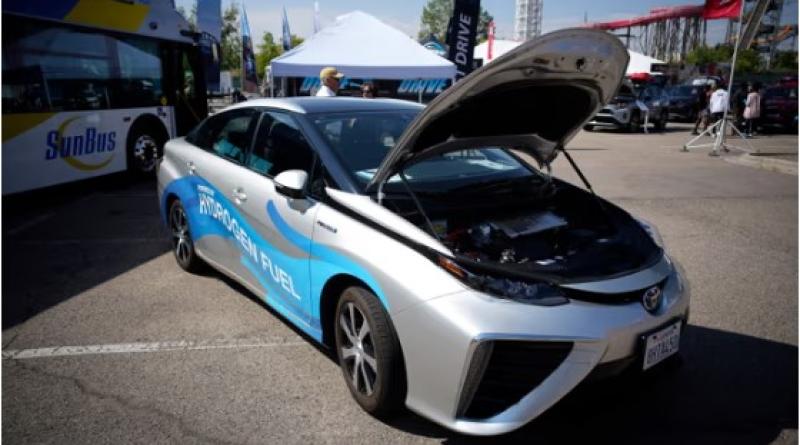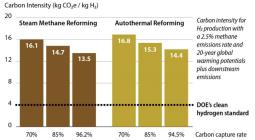Biden administration to award $7bn in grants to create US ‘hydrogen hubs’

Energy department says program will achieve climate goals, but climate advocates are skeptical it will reduce emissions
The US Department of Energy has selected seven projects for a $7bn program to launch the development and production of hydrogen fuel, the White House announced on Friday.
The Biden administration says the program will constitute a major boost to the country’s nascent clean hydrogen industry, helping it achieve its climate goals. But many climate advocates are skeptical that it will actually help reduce emissions.
Unlike coal, oil and gas, when burned, hydrogen does not produce greenhouse gas emissions. It can be produced using carbon-free energy, but roughly 96% of it is currently derived from planet-heating fossil fuels – something the Biden administration hopes to change.
“With this historic investment, the Biden-Harris administration is laying the foundation for a new, American-led industry that will propel the global clean energy transition,” said Jennifer Granholm, the secretary of energy, in a statement.
The money will be awarded to proposed hydrogen projects on the Gulf Coast and in the mid-Atlantic, Appalachia, midwest, upper midwest, Pacific north-west and California. Dozens of regions competed for funds from the $7bn pot, set aside in the 2021 bipartisan infrastructure law. On Friday, Joe Biden will travel to Philadelphia to promote the mid-Atlantic hub.
The Department of Energy says it expects the funding to help cut 25m metric tons of carbon dioxide emissions annually, the equivalent of removing 5.5m gasoline-powered vehicles from the road each year.
But some experts say the new initiative could amount to little more than greenwashing. Though researchers agree that truly clean hydrogen, produced without fossil fuels, can fulfill certain crucial roles in hard-to-decarbonize sectors, including in the production of synthetic fertilizers and steel, studies have found it to be much less efficient for home heating and transportation than technologies such as heat pumps and electric vehicles.
“Direct electrification and batteries offer so much more, and much more quickly,” Robert Howarth, a professor of ecology and environmental biology at Cornell University, told the Guardian this year.
Despite this, fossil fuel companies have spent years promoting hydrogen production as a catch-all climate solution. Some have used the hope of clean hydrogen to justify building more pipelines, claiming that they can be used to transport the climate-friendly fuel in the future.
Climate advocates also note that hydrogen production, even when powered by renewable energy, can be highly water intensive. And since hydrogen is also a highly flammable and corrosive element, it can create risk for workers.
Oil companies often say fossil fuels can power hydrogen production, so long as any emissions produced are trapped with carbon capture and kept out of the atmosphere.
But carbon capture technology is not currently available at commercial scale, and a 2021 paper co-authored by Haworth found that using methane gas paired with carbon capture to produce so-called “blue” hydrogen for home heating could produce more climate-warming pollution burning gas, coal or diesel oil.
“At face value – and according to the Biden playbook – the hydrogen hub grants aim to help transition the United States to clean energy,” said Marion Gee, the co-executive director at the Climate Justice Alliance, a national coalition of grassroots environmental justice groups. “In reality, they amount to another corporate scam, one that preserves and extends the life of the extractive economy and prevents the frontline communities most impacted by climate disaster from having input.”
Julie McNamara, the deputy policy director of the science and climate advocacy organization Union of Concerned Scientists, said the administration should impose stricter regulations on the hydrogen hubs to boost community input and ensure only completely fossil-free projects receive funding.
“Concerningly, today’s H2Hubs announcement advances multiple projects premised on fossil fuel-based hydrogen production and risky hydrogen end uses,” she said. “Billions of taxpayer dollars are at risk of perpetuating fossil fuel industry injustices and harms while subsidizing fossil fuel greenwashing.”
Photograph: David Zalubowski/AP - A 2021 Toyota Prius that runs on a hydrogen fuel cell on display at the Denver auto show on 17 September 2021.






